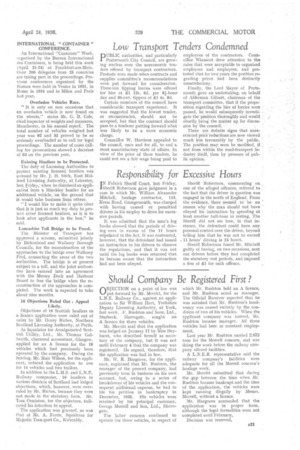Low Transport Tenders Condemned p liBLIC authorities, and particularly Portsmouth City
Page 35

If you've noticed an error in this article please click here to report it so we can fix it.
Council, are growing restless over the uneconomic tenders offered by transport contractors. Protests were made when contracts and supplies committee's recommendations were put forward for consideration. Three-ton tipping lorries were offered for hire at £.1 12s. 6d. per 8j-hourday and 30-cwt. tippers at £1 4s. 8d.
Certain members of the council have considerable transport experience. it was suggested that the lowest tender, as recommended, should • not be accepted, but that the contract' should pass to a tenderer putting forward what • was likely to be a more economic charge.
Councillor W. Harrison appealed to the council, once and for all, to end a Most unsatisfactory state of affairs. In view of the price of these tenders, he could not see a fair wage being paid to employees of the contractors. Councillor Winnicot drew attention to the rates that were acceptable to organized employers and employees, and protested that for two years the position regarding prices had been distinctly unsatisfaCtory.
Finally, the Lord Mayor of Portsmouth gaVe an undertaking, on behalf of Aldbrman Gilbert, chairman of the transport committee, that if the proposition regarding the hire of lorries were passed, he would subsequentlyjnyestigate the: pbsition thoroughly and Would shortly brini the matter up for discusskin bY the,councii.
There are definite signs that unrestricted price reductions are now viewed much has favourably by the public. The position. may soon he modified, if not from Within the road-transport industry itself, then by pressure of public opinion.




























































































